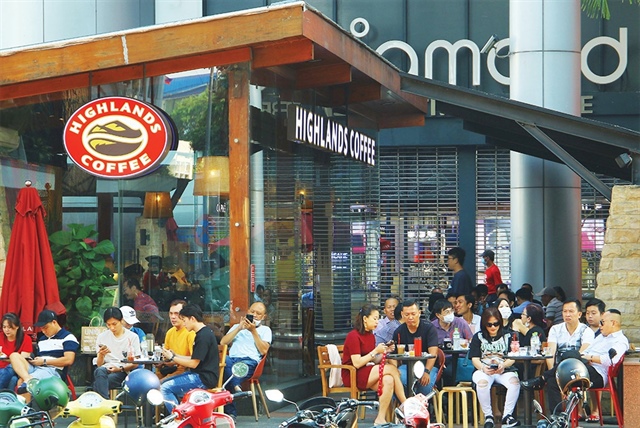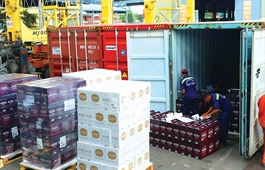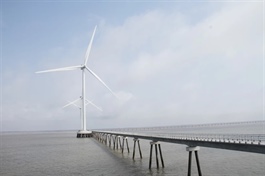Domestic drinks chains set to step-up
Domestic drinks chains set to step-up
Foreign beverage chains continue to dominate the Vietnamese market, while local brands restructure and expanding to recapture market share.
Two weeks ago, Highlands Coffee inaugurated its new roasting plant, Highlands Cai Mep, in the Phu My Industrial Zone in the southern province of Ba Ria-Vung Tau. Covering nearly 24,000 square metres and with a total investment of nearly $21 million, the facility marks a significant milestone in the brand’s 25-year journey. In its initial phase, the Cai Mep plant has a production capacity of approximately 10,000 tonnes of coffee per year, with the potential to scale up to 75,000 tonnes annually once fully operational, making it one of the largest coffee roasting facilities in the country.

Domestic drinks chains set to step-up. photo Le Toan |
David Thai, founder and CEO of Highlands Coffee, said that the plant is equipped with modern, German-imported machinery and operates with international-standard automation.
“As a brand born in Vietnam and closely tied to the Vietnamese people for the past 25 years, Highlands Coffee takes great pride in its national roots and carries the ambition to elevate Vietnamese coffee onto the international stage,” said Thai. “This roasting plant represents our commitment to the essence of Vietnamese coffee.”
To realise its goal of boosting Vietnamese robusta globally, Highlands has partnered with Simexco Daklak to develop its raw material sources and create high-value coffee products. Under this partnership, Simexco Daklak will supply both commercial and speciality-grade robusta beans in line with Highlands’ standards, while also developing dedicated farming regions to ensure traceability and enhance quality through sustainable cultivation practices.
In turn, Highlands Coffee Roastery will have exclusive purchasing rights to Simexco’s products, which will serve as core ingredients in brand-building and the promotion of Vietnamese robusta coffee.
According to BlueWeave Consulting, the Vietnamese coffee market is projected to reach $1.1 billion by 2030, growing at an annual rate of over 8 per cent.
According to the Ministry of Industry and Trade, the food and beverages sector recorded impressive growth in 2024, reaching 10.9 per cent and surpassing $28.8 billion in revenue. The industry is witnessing the rapid growth of franchised beverage chains, with both domestic and international brands racing to expand.
With rapid urban population growth and shifting consumer behaviours, Vietnam’s coffee market is becoming a fertile ground for major chains, independent coffee shops, and production enterprises alike. Numerous modern coffee factories are being established to meet demand.
Capitalising on this opportunity, American powerhouse Starbucks is also aggressively expanding in Vietnam. Mai Ho, general director of Starbucks Vietnam, said, “The company plans to open 10 additional stores by June, bringing the total number to 135 across 19 provinces and cities.”
In April, Starbucks opened its Starbucks Reserve Bitexco outlet in Ho Chi Minh City, marking the return of its Reserve model to the city. Located in the iconic Bitexco Financial Tower, one of Vietnam’s tallest buildings, the two-storey outlet features Starbucks’ classic menu on the ground floor, while the upper floor is dedicated to its Reserve coffee bar and Mixology counter.
Along with moves from foreign players, local brands are altering their strategies to grab more market share.
In March, Trung Nguyen Legend held the groundbreaking ceremony for Southeast Asia’s largest coffee plant, located in Tan An 2 Industrial Cluster in the Central Highlands city of Buon Ma Thuot.
This is Trung Nguyen Legend’s fifth plant in Vietnam and its second in the city. It represents the brand’s fourth initiative towards building a closed-loop coffee production chain that generates no waste, optimises resources, and protects environment.
Elsewhere, The Coffee House was earlier this year acquired by Golden Gate, which operates restaurant chains Kichi Kichi, Gogi House, and Manwah.
Golden Gate’s 2024 audited financial report revealed that in January, Golden Gate completed the purchase of 99.98 per cent capital of VN Tea and Coffee Service Trading JSC, the owner of The Coffee House chain, totalling $10.3 million. At the end of 2024, Golden Gate made a deposit worth over $2 million for the deal.
The deal takes place amid The Coffee House’s lacklustre performance. Last year, the chain shut down over 30 outlets.
Industry expert Hoang Tung said that with a sound restructuring strategy from the new owner, the coffee chain is well-positioned for a strong recovery. “The Coffee House has a loyal customer base, and its remaining outlets are strategically positioned, providing a significant advantage for Golden Gate as it seeks to expand in the industry,” Tung said. “Another bright spot is its technological capabilities, particularly in collecting and analysing customer data via its app.”
- 12:45 03/05/2025























